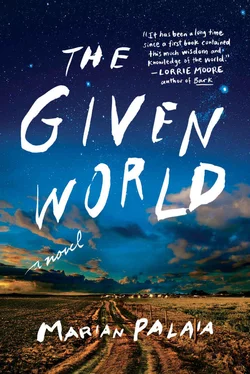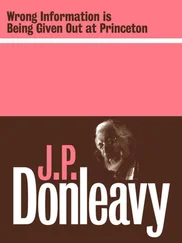I nod, in what I hope is a convincing manner.
“You know it is not normal for you to imagine people might think that, right?”
“Right,” I say.
The place I am going to see is actually on a side street off Potrero Avenue, meaning it is not technically a Potrero Hill flat, but I can understand why anyone in search of a renter would advertise it as one. Down here in the flatlands, life is much more industrial, much less picturesque and trendy than it is up higher. But flat land is fine by me: level ground will probably come in handy for the more dissociative times, and those times will surely come around. Despite this new and somewhat disconcerting yen for stability, I know I’ll always look forward to — and if necessary find a way to manufacture — the occasional tectonic shift; the feeling of stepping off the curb and for a moment, due to certain smells or sounds or whatever other trigger, not knowing where the hell I am.
The street feels eerily quiet. It is the weekend, but even so, it seems as though there should be more people around, more noise, more traffic. I think about Saigon, the incessant sensory overload, and suppose anything short of an ongoing riot is going to seem strange for a while.
Here there are houses just like on any other block, but also a fair number of businesses, ones that do not cater to the Sunday-afternoon-stroll crowd: auto repair and machine shops, a fenced-in truck rental compound, a Texaco station, a screen printer’s studio in a pale-blue building at the corner. It isn’t really a neighborhood — is nothing at all like the blocks to the east, on which the coffee shops and florists and boutiques blend right in; they fool you into thinking maybe you aren’t in a city at all but in some lovely suburb made to look like one.
I think about trying to relate this bit of insight to Eddie, but don’t. I know there is probably something wrong with my reasoning but am unclear as to which parts I should leave out, or what I could add that would change that. It is good enough for now to be able to recognize this place is a little bit outside , and even though I can’t explain the concept (outside of what?), I can accept this recognition as a small but adequate step toward reentry.
I think of a Rickie Lee Jones song, part of a tape I once played over and over in my car. It is about a gas station, and about love, about running out of possibilities. I haven’t heard it in forever. Haven’t listened to Rickie Lee Jones since Lu went off the grid.
We ring the bell, and a vision appears. He is wearing cutoff jeans, a pale-yellow sweater vest that sets off beautifully the ornate “Mamma Mia” tattoo covering his left shoulder, fluffy white bunny slippers, and at least a dozen silver rings on each hand. His thick, platinum-blond hair is swept up into a configuration that falls somewhere between pompadour and bouffant. Combined with his shockingly high cheekbones and eyelashes long enough to brush them when he blinks, he looks like the cover girl on some outrageous Norwegian girlie magazine.
A voice from the top of the stairs — the voice from the phone — calls down, “You forgot your boa, baby. I thought you were trying to make an impression.”
The door answerer lifts his chin and rolls his eyes. He holds his hand out to each of us in turn, palm down and wrist bent, as if expecting a curtsy and a kiss.
“Max,” he says. “At your service.”
Eddie simply shakes Max’s hand, but I take hold of it with both of mine, because this is apparently one more thing I have forgotten how to do. Max cocks his head and eyes me appraisingly, seeming to decide only now to let us in. He stands back from the door and motions us up the stairs.
“You may ignore the skinny brunette if you’d like. She hasn’t had her pill yet this morning.”
The “skinny brunette” is indeed both of those things, but with his fine, longish hair and horn-rimmed glasses, he looks, in comparison and just in general, totally unastonishing. Eddie, I’m sure, doesn’t differentiate one way or the other. Boys. The more the merrier.
Christopher says, “He made that up, about the pill. In case you were wondering.”
“Oh no,” I say. “I wasn’t wondering.”
Eddie says, “Yes she was. I was too. I was wondering if you’d share.”
Everyone laughs, except Max, who is only halfway up the stairs. “Don’t start the party without me, wenches.” He sounds serious.
In the living room are a leather sofa, a huge TV, two brocaded armchairs by the window, a coffee table made of a four-inch-thick slab of what looks to be polished concrete, and the biggest cat I have ever seen. Big and fat. Black and white and enormous.
I say, “That must weigh a ton.”
“That is Annabelle,” Max says. “Don’t hurt her feelings. She has a thyroid problem.”
“No. I’m sorry. I didn’t mean her. I meant the table.”
I bend down and knock on it. It’s embedded with hundreds of tiny multicolored pebbles, and is indeed made of cement somehow buffed to glossy smoothness.
“Wow. I’ve never seen anything like that.”
“No one has,” Christopher says. “It’s Max’s only family heirloom. His father made it. Allegedly.”
“Nothing alleged about it.” Max sits down on the couch, runs his fingers admiringly along one polished edge of the table, and crosses one bunny-slippered foot over his knee. “My father had a very unique sense of style.”
Christopher squeezes Max’s knee and smiles at Eddie and me. “Runs in the family,” he says. “You may have gathered.”
We talk about Montana, as the boys seem fascinated by what little they’ve heard of it, and have it in their heads that all the sidewalks are still wooden there, and people get from place to place on horseback. I feel strangely at ease, drugged almost, but still able to hold up my side of a conversation. I write it off to jet lag and go with it.
“Some do,” I tell them, “But in the cities, they’ve graduated to buggies. They still need horses to pull them though.”
Max slits his eyes at me and cocks his head. “They have cities ?”
“Oh, yeah. Huge. Four-story buildings and everything.”
Max presses a manicured index finger to the hollow below one sharp cheekbone. “You are completely full of shit, aren’t you?”
“Sort of,” I say. “Sometimes.”
Eddie leans in. “Always.”
“Not always.”
Max says, “I vote for always.”
No one is the least bit interested in Vietnam, or why I went there, and that is fine with me.
The boys converse for a while about new bars in the Castro and the Fillmore district, and when that topic is played out, Max offers a proclamation.
“I like this one,” he says, motioning toward me but speaking to the cat, who by now is draped upside down over his lap, belly flapping out to either side, love-child composite of cat and manta ray. She peers up at Max and does not protest. Christopher’s smile is sweet and guileless, and I am blown away. Honored. Dizzy as we head for the car.
“Welcome home,” Eddie says.
“Home,” I repeat after him, as if it is some kind of incantation that will eventually take.
• • •
The house is a typical, semi-run-down Victorian, ivory white with barely visible traces of rose and turquoise trim. Our flat is on the second level, above the downstairs apartment and the garage. The hardwood floors still shine in places, and the ceilings are twelve feet high. In the living room, along with the leather sofa and the huge TV, is a fireplace with two mantels, one below a large mirror and one above it. My bedroom is already fitted out with lace curtains over an entire wall of windows, and through them I can just see a few blocks up the street to the iron picket fence bordering SF General.
Читать дальше












